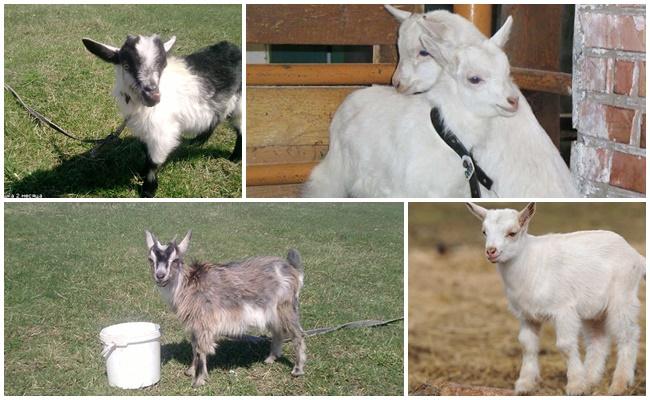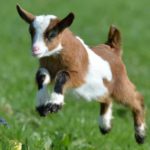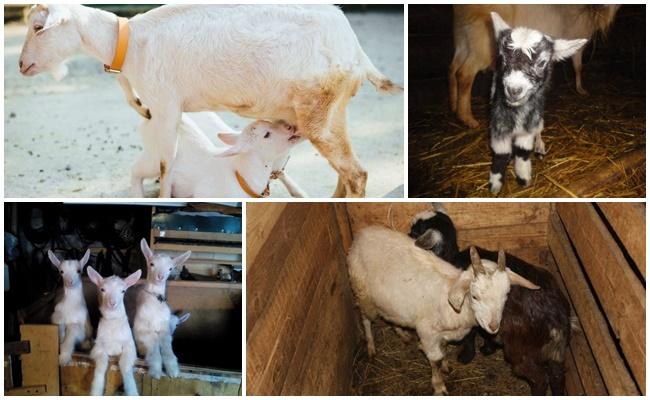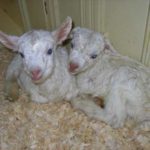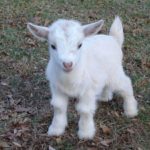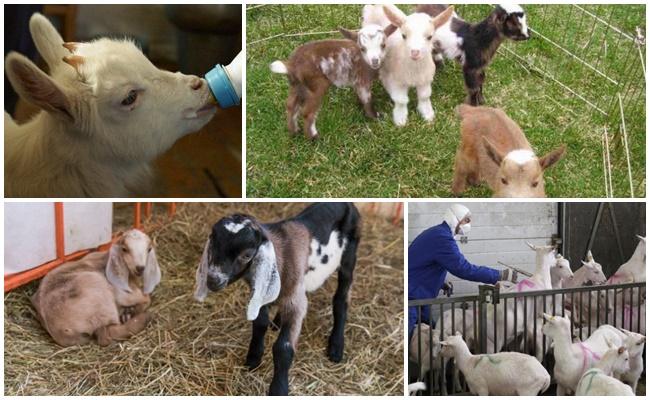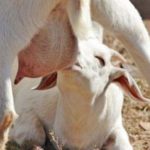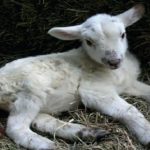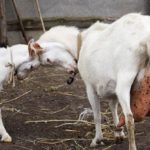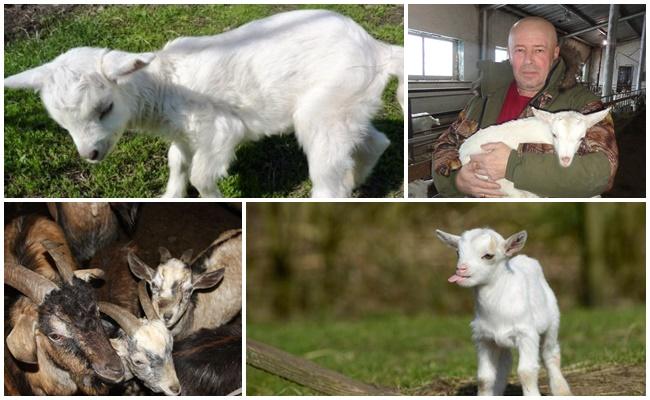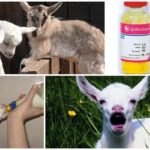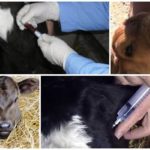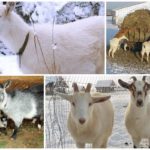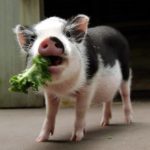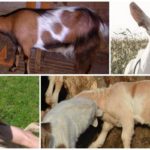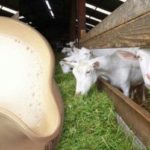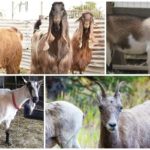Kids don't always grind their teeth because their teeth are growing. A novice or inexperienced farmer may not attach importance to this phenomenon, but most often the grinding of teeth in goats is a clear sign that indicates the presence of some disease. In this case, it is better not to delay a veterinary examination, and it is advisable to find out the reason as soon as possible: why the little goat often grinds its teeth.
Non-communicable diseases
Compared to other farm animals, goat offspring have an enviable immune system and rarely get sick. If a kid gets sick, you should identify the presence of the disease in time and try to help him.
A non-communicable disease may appear if:
- kids are fed incorrectly (with low-quality feed);
- give the offspring of goats milk obtained from sick females;
- young animals are kept in unsuitable conditions.
Non-infectious diseases rarely occur in goats, but they are difficult to treat, and the likelihood of developing pathologies in such cases is high. The first sign of disease in a goat that grinds its teeth is loss of appetite.
Poisoning
If the kids are very small, then the farmer does not take them out to pasture, and the likelihood of getting poisoned by poisonous plants is minimal. Most likely, the animal can become poisoned due to improper feeding with unsuitable feed or food that is suitable only for adult goats. Feed may contain harmful pesticides or toxins.
In addition to teeth grinding, your baby goat may have the following symptoms:
- gastrointestinal disorders;
- refusal of food;
- nervous system disorders;
- high blood pressure and rapid pulse;
- breathing too quickly.
If the animal is severely poisoned, there may be serious symptoms from the nervous system, such as convulsions, paralysis and temporary loss of vision. You can provide assistance yourself or call a veterinarian if the poisoning was caused by a dangerous poison.
Vitamin deficiency, hypovitaminosis
If a growing kid does not eat, does not drink milk and grinds his teeth, then perhaps his metabolism is disturbed and his body is missing some elements. If you feed your goat incorrectly, over time it will become deficient in vitamins such as A, B, C, D and E.The appearance of an animal that has vitamin deficiency is emaciated and thin.
Teeth grinding is a common sign indicating a lack of nutrients in the body. Hypovitaminosis can occur if an animal receives vitamins, but in insufficient quantities. In this case, it is better to change the diet in order to give the goats better types of feed.
Gastroenteritis
Improper feeding can contribute to the development of a non-infectious disease such as gastroenteritis. Feeding low-quality feed to animals contributes to inflammation of the gastric mucosa. The disease makes itself felt when young animals are fed milk obtained from a goat with mastitis. Individuals who have been abruptly switched to a plant-based diet from mixed feed can also develop gastroenteritis.
In addition to teeth grinding, symptoms such as fever and stomach upset appear.
Acute tympany
Acute tympany is provoked by frequent changes in diet or poor quality food. The animal begins to suffer from abdominal pain that occurs from an excess of gases.
Examples of diet changes that can cause gas formation in the intestines of goats:
- transfer from milk and feed to hay;
- changing nutrition from whole grains and beans to succulent feed and organic matter.
Infectious diseases
The list of infectious diseases of domestic farm animals is extensive, and not only a small goat can get sick, but also its owner, since infections are also transmitted to people. Infectious diseases arise when young animals become infected with dangerous microorganisms, for example, on pasture or in a dirty barn.
Echinococcosis
Parasitic helminths enter the body of goats in feces, which they can eat along with grass.Goats become infected when they graze on pastures and eat infected plants containing waste from sick animals. The disease affects the kidneys, liver and general muscles of the kid. Over time, the individual becomes very depleted.
If young animals have symptoms such as teeth grinding and convulsions, then it is possible that helminths are not only in the stomach, but also in the brain. There is no cure for this disease, as there is no cure for it. There is no prevention or therapy for echinococcosis.
Dictyocaulosis
Pulmonary invasive parasites can be acquired by livestock when they eat grass that has been infected dictyocaulosis in feces of other animals. A baby goat can become infected if it is older than 3 months and is already allowed to graze with adult goats in a meadow or pasture. The reason for the appearance of pulmonary parasites is a rare change of pastures, which should be done every 5-6 days.
Piroplasmosis
Parasitic infection of the circulatory system by the pathogen Piroplasma ovis. The parasite enters the body when an animal is bitten by a tick carrying the piroplasmosis virus. The disease is seasonal, and the risk of contracting it increases from May to June.
Symptoms piroplasmosis in goats:
- elevated temperature;
- anemia;
- yellowing of mucous membranes;
- general deterioration of health;
- refusal of feed compounds;
- rapid pulse;
- digestive disorders.
In addition to the gnashing of teeth, the small child of goats defecates urine of a dark red hue, as hemoglobin begins to be excessively released through the kidneys.
In most cases, little kids die from piroplasmosis and only 30% of the total infected number survive, but have weak immunity in the future.
Infectious agalactia
The infection occurs in female goats that are in the lactation period. The course of the disease can be acute or chronic, in the form of damage to the mammary glands, joints and eyeballs. Almost 50% of cases of infection lead to the death of livestock. Infected queens become carriers of the virus and are dangerous to their offspring.
Sick queens are not placed in the same pen with newborn kids. To prevent the spread of infectious agalactia, the farmer needs to carry out comprehensive sanitary and veterinary treatments of the premises.
Infectious mastitis
With poor quality milking, females may develop an udder infection, especially if the individual experiences milk stagnation for some reason. Mastitis can be caused by keeping dairy goats in a space that is too cold and lacks warmth. Little goats are unlikely to get this infection. In adult goats, the disease is determined by the following signs:
- The affected udder becomes hard and increases in size.
- The skin on and around the nipples turns blue-violet.
- At first, fluid is released from the udder, and then blood and pus.
- Body temperature rises and the animal becomes weakened.
- The goat refuses her favorite food. The individual does not have chewing gum and may begin to grind its teeth regularly.
Infectious pleuropneumonia
The lungs and pleura are affected by harmful microorganisms - mycoplasmas. Individuals aged 3 years and older are prone to the disease, but even at an early age, goat kids are also not immune from infection.When exposed to disease vectors, it is easy for livestock to become carriers of mycoplasmas.
The infection is transmitted through coughing saliva or mucus secreted from the nasal cavities, as well as through the urine of goats. An infected kid suffers from general weakness in the body, coughing and wheezing in the lungs. The body temperature becomes elevated, appetite disappears and, as an additional symptom, unpleasant teeth grinding occurs.
Despite the fact that goats are hardy animals with good immunity, the risk of contracting dangerous infectious or non-infectious diseases is high. If your baby goat begins to grind its teeth, you should check it for infections, since this minor sign is not always associated with the eruption of bone formations.

